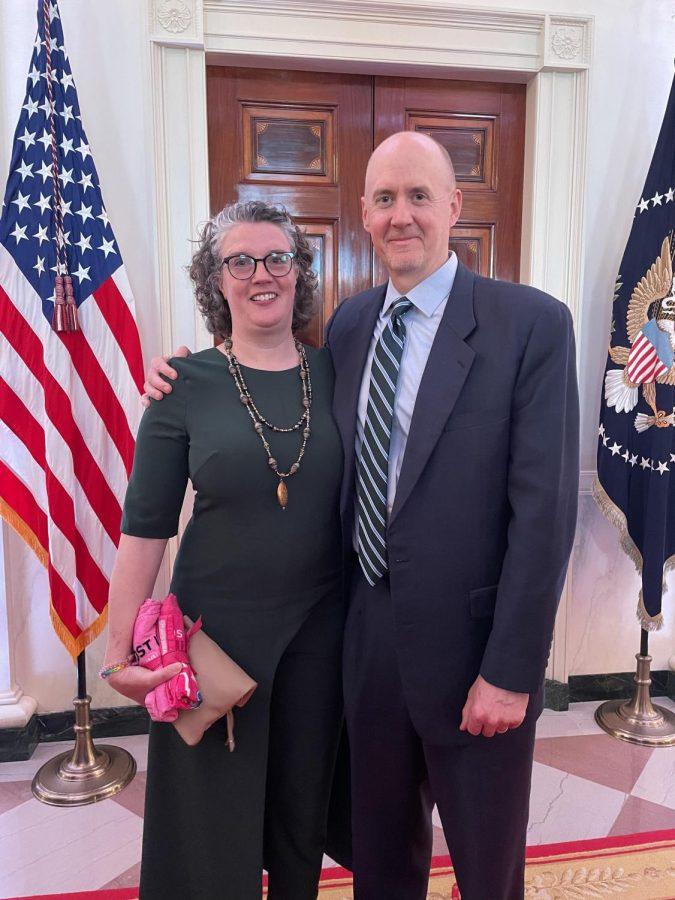Pitt PhD candidate invited to White House for advocacy work
Image courtesy of Amy Raslevich
Amy Raslevich (left), a PhD candidate for Health Services Research and Policy in Pitt’s School of Public Health.
April 7, 2022
When Amy Raslevich answered a FaceTime call on March 23, she had no idea former President Barack Obama would be on the other end.
Obama called Raslevich to thank her for her work with the organization Protect Our Care, where she’s advocated in support of the Affordable Care Act since 2018. She attends different panels and press conferences where she shares her personal health care story, how the ACA has benefitted her and her family as well as why it should be protected.
“I didn’t know how to react. It was completely overwhelming and surprising,” Raslevich said. “The fact that he was calling to say thank you to me, I told him was completely ridiculous because he had done it, but it was pretty incredible.”
Raslevich said for nearly 35 years, she’s held a variety of positions relating to health provision and health insurance. After receiving a diagnosis of ductal carcinoma in situ, a form of breast cancer, in July 2017, Raslevich decided to return to school and began earning a PhD in Health Services Research and Policy through Pitt’s School of Public Health in 2018.
“Life is fragile. Life is short,” Raslevich said. “I wasn’t working on what I was passionate about, so I wanted to make that change.”
Shortly after the call from President Obama, Raslevich found an email in her inbox that she originally believed to be spam. It was addressed to Raslevich from the White House and included a formal invitation from President Joe Biden to join him at the signing of an executive order on Tuesday to strengthen the ACA and Medicaid coverage.
Raslevich said about 150 people, plus press, attended the event at the White House. The crowd included staffers from both the Biden and Obama administrations, various members of Congress, advocates from other organizations and about five cabinet members, according to Raslevich.
Adrianne Sapienza, a diabetes educator at UPMC Children’s Hospital and a Pitt graduate, also received an invitation to the White House event.
Sapienza was diagnosed with Type I diabetes at only 4 years old and said while she listened to Biden’s State of the Union address, many emotions arose when Biden introduced Joshua Davis, a 13-year-old boy with Type I diabetes. Biden also discussed lowering prescription drug prices and a proposed $35 monthly cap on insulin. The next day Sapienza began writing a letter she originally thought no one would see.
In her letter, Sapienza thanked President Biden for having the young representative there to show how diabetes affects people of all ages. She also wrote about how the 2020 election caused her a lot of anxiety about the future of healthcare, both for herself and others.
“At one point, my Insulin prescriptions were late, and you need insulin every day, so my parents had to pay $800 out of pocket to get me that insulin,” Sapienza said. “Thankfully they do have good insurance, so it was a problem I never had to run into again, but for people who don’t have insurance, that 30 days supply, that one vial, only lasts you for a month and then you are at a crossroads again paying out of pocket.”
Raslevich had previously met with Biden during summer 2020, when she spoke at a televised Protect Our Care event. Before the event, Raslevich completed a health policy course, where one of her assignments included evaluating Biden’s proposed health care plan during the election. She ended up presenting this evaluation to Biden and highlighted areas where the law could be improved and where his policy was “short-sighted.”
Raslevich said they sat in a socially distanced circle and passed around a microphone sharing their healthcare experiences and how the ACA has impacted them. She said Biden spoke about his experiences with his son, his experience taking care of his father and his own experience within the healthcare system.
“The conversation was lovely,” Raslevich said. “We were treated very well, but it was almost intimidating to be there because it was such an intense election cycle.”
Julie Donohue, the chair of and a professor at the Department of Health Policy and Management in Pitt’s School of Public Health, said the department’s research findings indicate that the ACA has been one of the “most important changes to social policy in decades,” but she can still identify areas for improvement.
“Health care is still way too costly and unaffordable for many,” Donohue said. “We still have significant inequities by race, ethnicity and income in insurance coverage, access to care and health outcomes that must be addressed.”
Raslevich said it’s important for people to understand that the ACA does not exist solely for those who are uninsured. She said the ACA also made employer-based insurance “exponentially better.”
“It’s an abomination that America is one of the only wealthy countries in the world that doesn’t have universal, guaranteed insurance,” Raslevich said. “This is a step towards giving people back the opportunity to reach their full health potential.”








